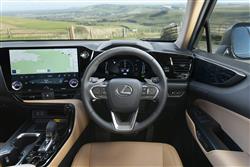Lexus NX - ABC Leasing
How will you view?
This is a sample, showing 30 seconds of each section.
NO LONGER AN N-IGMA(some text hidden)
By Jonathan Crouch
Ten Second Review word count: 299
With this second generation NX, Lexus has brought us a strikingly styled premium mid-sized SUV that's unafraid to go its own way when it comes to cars of this kind. It's still one of the only models in its class that can't be ordered in diesel form, offering instead a beautifully refined and highly efficient petrol/electric Hybrid powertrain, available in PHEV Plug-in as well as self-charging forms. If you're choosing in this segment, most of the magazines will tell you to buy something German. But if this revitalised NX appeals, you may well feel that you know better. And you could be right. As you might already be aware, there are two distinct versions of the NX, full-Hybrid or PHEV. Most will want the more affordable full-Hybrid self-charging 350h version, with a powertrain that you can't plug in but which can run fully electrically, independently of the combustion unit for some of the time, a formula still ignored by all this car's most direct Crossover rivals. That drive format uses a fourth generation Hybrid system retaining the previous AZ10 model's 2.5-litre four cylinder format, but offering 24% more power, which means 241bhp beneath your right foot. With a self-charging Hybrid NX, there's a choice between having a front-driven model - or the AWD 'E-FOUR' version, which is slightly quicker, making 62mph from rest in 7.7s. The AWD version gains its extra acceleration courtesy of the addition of a second electric motor driving the rear axle and producing a further 53bhp. With the alternative NX 450h+ plug-in variant, which has to be had with the AWD system, total output is raised to 305bhp to compensate for the extra 180kg weight of the PHEV system's big 18.1kWh battery. That delivers an impressive potential EV driving range of up to 47 miles.
Background word count: 178
With this second generation AZ20-era version of its NX mid-sized SUV, launched in 2021, Lexus at last seemed to have sorted out its SUV and drivetrain strategy. Prior to this model, the brand had never had a properly-sized mid-shaped model similar in aspiration and shaping to key premium models like the Audi Q5 and the Mercedes GLC. The company's first generation AZ10-era NX crossover wasn't quite big enough to fill that role, but it was just a little too large and pricey to fill the compact premium SUV niche subsequently taken by the smaller Lexus UX. This second generation NX, in contrast, was a direct Q5 and GLC rival, also taking on cars like the BMW X3 and the Jaguar F-PACE on equal terms. A key change for this MK2 model was the availability of a Plug-in Hybrid option, something no Lexus in history had previously ever provided. Most customers though, stick with the standard NX 350h model's self-charging Hybrid powertrain. In mid-2024, Lexus announced a package of mid-term NX updates, creating the car we look at here.
Driving Experience word count: 298
As you might already be aware, there are two distinct versions of the NX, full-Hybrid or PHEV. Most will want the more affordable full-Hybrid self-charging 350h version, with a powertrain that you can't plug in but which can run fully electrically, independently of the combustion unit for some of the time, a formula still ignored by all this car's most direct Crossover rivals. That drive format uses a fourth generation Hybrid system retaining the previous AZ10 model's 2.5-litre four cylinder format, but offering 24% more power, which means 241bhp beneath your right foot. With a self-charging Hybrid NX, there's a choice between having a front-driven model - or the AWD 'E-FOUR' version, which is slightly quicker, making 62mph from rest in 7.7s. The AWD version gains its extra acceleration courtesy of the addition of a second electric motor driving the rear axle and producing a further 53bhp. With the alternative NX 450h+ plug-in variant, which has to be had with the AWD system, total output is raised to 305bhp to compensate for the extra 180kg weight of the PHEV system's big 18.1kWh battery. That delivers an impressive potential EV driving range of up to 47 miles. Whichever flavour of NX you prefer, this second generation model has been engineered to deliver what the brand calls its 'Lexus Driving Signature', a supposedly ideal combination of comfort and handling dynamics apparently honed by professional racing drivers. You shouldn't get your hopes up too high here, but this does actually represent quite a step forward by Lexus standards. The reasons why lie with 30% more body rigidity from this MK2 model's GA-K chassis, plus 20% faster steering responses and a fresh suspension design, which can be had with 'AVS' 'Adaptive Variable Suspension' adaptive damping if you opt for an 'F-Sport' model.
Pictures (High res disabled)

.jpg)
.jpg)
.jpg)
.jpg)
.jpg)
.jpg)
.jpg)
.jpg)

Scoring
Category: Compact Car
| Performance | |
| Handling | |
| Comfort | |
| Space | |
| Styling | |
| Build | |
| Value | |
| Equipment | |
| Economy | 80% |
| Depreciation | 70% |
| Insurance | 80% |
| Total | 72% |